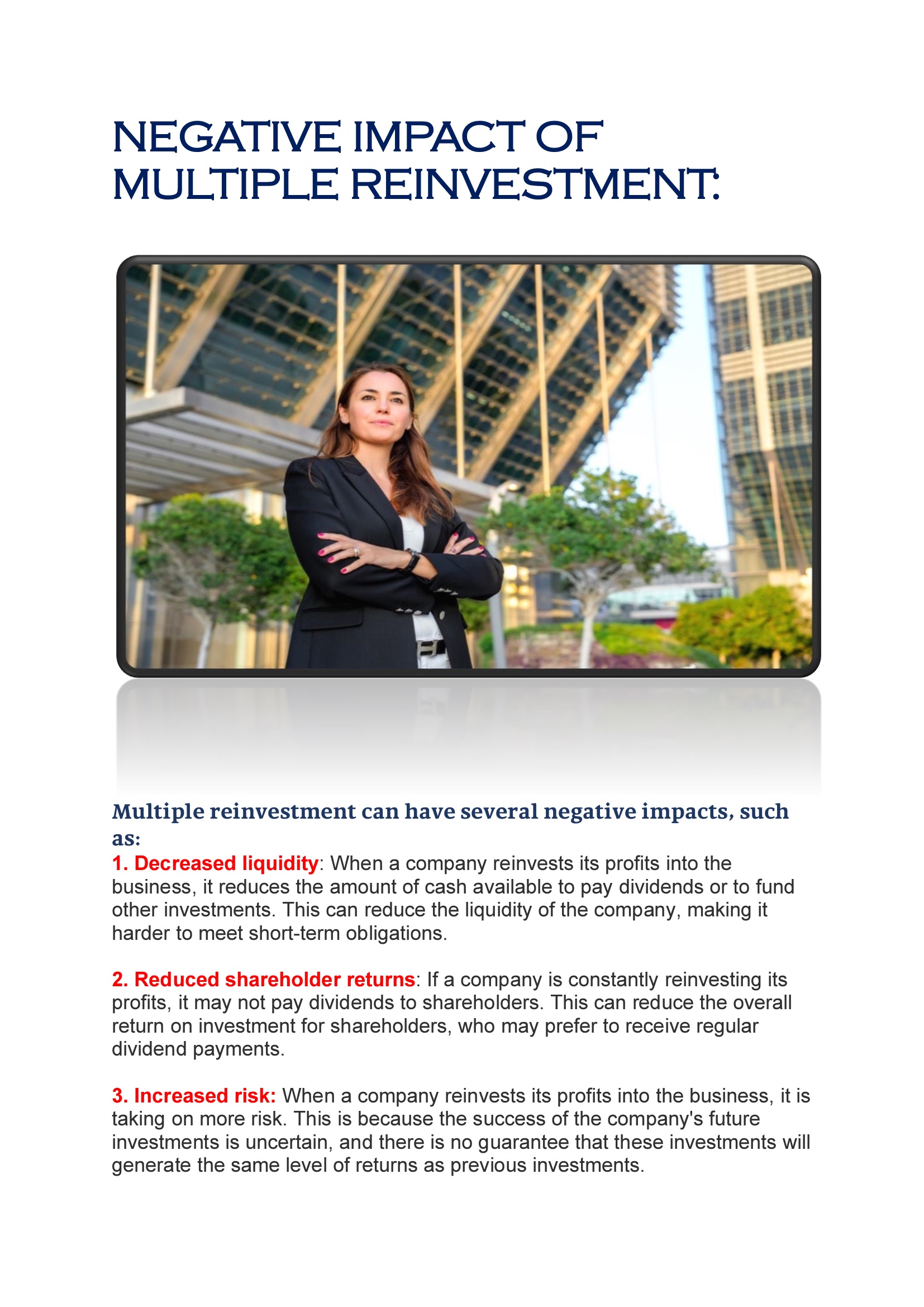Jeffrey Reyes • 1:29 AM April 22, 2023
BUILD A SUSTAINABLE FUTURE WITH iMOD TRADE AG || PTE LTD.
NEGATIVE IMPACT OF MULTIPLE REINVESTMENT:
Multiple reinvestment can have several negative impacts, such as:
1. Decreased liquidity: When a company reinvests its profits into the business, it reduces the amount of cash available to pay dividends or to fund other investments. This can reduce the liquidity of the company, making it harder to meet short-term obligations.
2. Reduced shareholder returns: If a company is constantly reinvesting its profits, it may not pay dividends to shareholders. This can reduce the overall return on investment for shareholders, who may prefer to receive regular dividend payments.
3. Increased risk: When a company reinvests its profits into the business, it is taking on more risk. This is because the success of the company's future investments is uncertain, and there is no guarantee that these investments will generate the same level of returns as previous investments.
4. Reduced flexibility: Companies that constantly reinvest their profits may become less flexible in their decision-making. This is because they may be lockedinto certain investments or business strategies that require a long-term commitment.
5. Reduced innovation: Companies that are focused on reinvesting profits into their existing business may be less likely to invest in new and innovative projects. This can make it harder for them to stay competitive in the long term.
It is important to pay interest rate due to accumulated income for several reasons:
1. Legal obligation: If you have borrowed money from a lender, you are legally obligated to pay back the principal amount plus any interest that has accumulated on the loan. Failure to pay interest can result in penalties, legal action, and damage to your credit score.
2. Maintain good credit: Paying your interest on time can help you maintain a good credit score. This is important if you plan to borrow money in the future, as lenders will look at your credit history and credit score to determine if you are a responsible borrower.
3. Avoid additional interest: If you fail to pay interest on time, the amount of interest owed will continue to accumulate, resulting in a larger debt. This can make it more difficult and expensive to pay off the loan in the future.
4. Maintain good relationships: If you have borrowed money from a family member or friend, failing to pay interest can damage your relationship with them. Paying interest on time shows that you are responsible and trustworthy.
5. Financial responsibility: Paying interest on time is a sign of financial responsibility. It shows that you are able to manage your finances and honor your commitments, which can help you build a positive reputation and improve your financial standing in the long run.
Benefits of investment Top-up deposit:
A top-up deposit is an additional deposit made to an existing account, and it can be beneficial for several reasons:
1. Meet minimum balance requirements: Many bank accounts and investment accounts require a minimum balance to avoid fees or earn higher interest rates. If you are close to falling below the minimum balance, a top-up deposit can help you maintain the required balance and avoid fees.
2. Take advantage of investment opportunities: If you have an investment account, you may want to take advantage of investment opportunities when they arise. Having a top-up deposit available can allow you to make a larger investment and potentially earn higher returns.
3. Increase savings: A top-up deposit can help you increase your savings over time. By consistently adding to your account, you can take advantage of compound interest and grow your savings more quickly.
4. Improve credit utilization: If you have a credit card with a high balance, making a top-up deposit can improve your credit utilization ratio. This is the amount of credit you are using compared to the total amount of credit available to you. A lower credit utilization ratio can improve your credit score.
5. Plan for future expenses: Making a top-up deposit can help you plan for future expenses, such as a down payment on a house or a child's college tuition. By consistently adding to your account, you can build up your savings over time and be better prepared for these expenses when they arise.
Our commitment to sustainability Read more >>>

